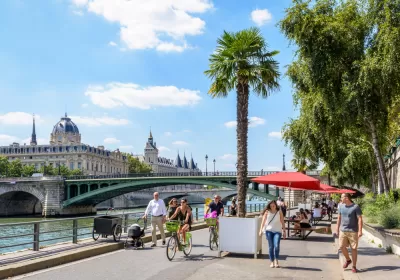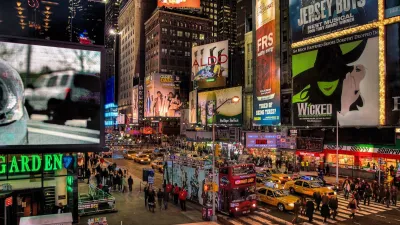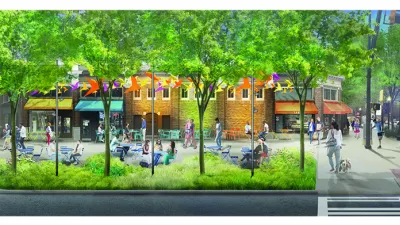The concept, touted as "hyper-local," can fail to take into account local conditions and historical inequities in American cities.

The concept of the "15-minute city" has been adopted as an aspirational buzzword by city leaders across the United States, but "there are dangers of applying a model conceived in Europe to many North American cities," writes Feargus O'Sullivan for Bloomberg CityLab. Urban designer Jay Pitter calls transplanting the idea potentially "presumptive and colonial," arguing that "it doesn't take into account the histories of urban inequity, intentionally imposed by technocratic and colonial planning approaches, such as segregated neighborhoods, deep amenity inequity and discriminatory policing of our public spaces" that are deeply embedded in American cities.
European cities, designed before mass car ownership, are more well-suited to the notion of the 15-minute city, writes O'Sullivan. The lofty goal of creating small neighborhoods where all amenities are within easy reach is "unlikely to reach all neighborhoods in many cities without drastic interventions and investments," and "simply injecting design changes such as bike lanes and parklets into a neighborhood will not reverse segregation that has been embedded into city planning."
The proposals neglect "a century of planning interventions that have actually concretized deep social divisions between people," says Pitter, calling the concept "top-down, technocratic urban planning" rather than a "systematic and holistic approach" that would more carefully consider social relationships and historic inequities. While it claims to be hyper-local, Pitter argues that implementing the approach without consideration to local conditions has the opposite effect.
FULL STORY: Where the ‘15-Minute City’ Falls Short

Planetizen Federal Action Tracker
A weekly monitor of how Trump’s orders and actions are impacting planners and planning in America.

Map: Where Senate Republicans Want to Sell Your Public Lands
For public land advocates, the Senate Republicans’ proposal to sell millions of acres of public land in the West is “the biggest fight of their careers.”

Restaurant Patios Were a Pandemic Win — Why Were They so Hard to Keep?
Social distancing requirements and changes in travel patterns prompted cities to pilot new uses for street and sidewalk space. Then it got complicated.

Platform Pilsner: Vancouver Transit Agency Releases... a Beer?
TransLink will receive a portion of every sale of the four-pack.

Toronto Weighs Cheaper Transit, Parking Hikes for Major Events
Special event rates would take effect during large festivals, sports games and concerts to ‘discourage driving, manage congestion and free up space for transit.”

Berlin to Consider Car-Free Zone Larger Than Manhattan
The area bound by the 22-mile Ringbahn would still allow 12 uses of a private automobile per year per person, and several other exemptions.
Urban Design for Planners 1: Software Tools
This six-course series explores essential urban design concepts using open source software and equips planners with the tools they need to participate fully in the urban design process.
Planning for Universal Design
Learn the tools for implementing Universal Design in planning regulations.
Heyer Gruel & Associates PA
JM Goldson LLC
Custer County Colorado
City of Camden Redevelopment Agency
City of Astoria
Transportation Research & Education Center (TREC) at Portland State University
Camden Redevelopment Agency
City of Claremont
Municipality of Princeton (NJ)





























